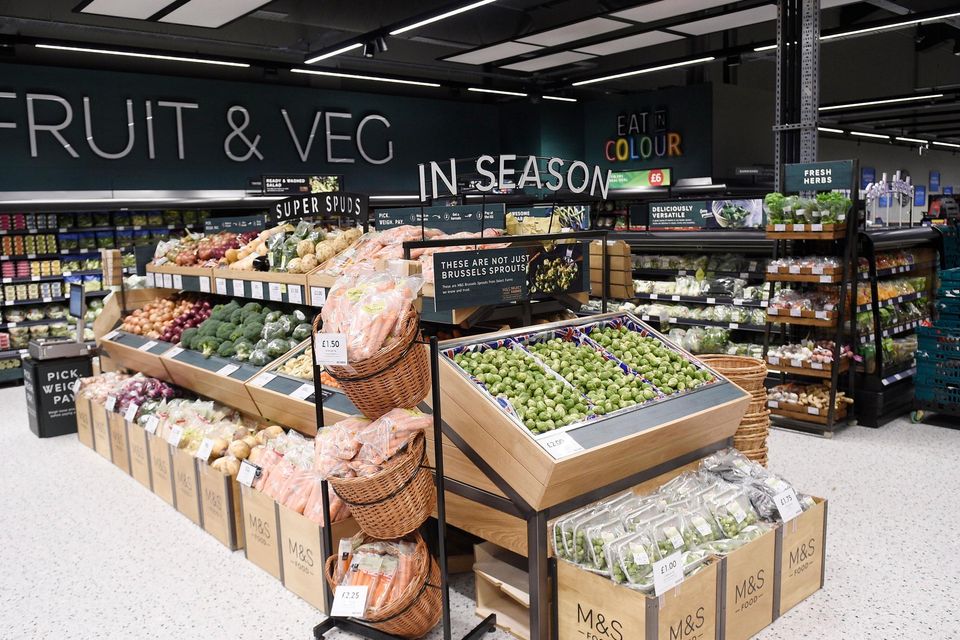Brexit has cost M&S up to £33m on the island of Ireland
M&S has faced problems with Brexit in terms of shipping goods into Northern Ireland and the Republic
Marks & Spencer has incurred costs of up to £33m due to the "enduring” impact of Brexit on its island of Ireland business as it announced a group-wide £201.2m pre-tax loss.
The company, which has 21 stores in Northern Ireland, said it’s having to find solutions to stabilise its business on both sides of the border.
And one answer could involve sourcing more products locally, which could be good news for suppliers in NI. Last month M&S described NI as one of its bigger supply regions.
M&S said there would be no immediate respite from dealing with the “challenging” effect of the Brexit deal on the supply of fresh and chilled product, particularly prepared food, into the EU.
It said the process was now “very lengthy and bureaucratic creating an enduring impact on availability and trading costs”.
Those complexities also apply to its business in Northern Ireland, under the NI Protocol agreed as part of the Brexit Withdrawal Agreement.
It has kept Northern Ireland in the EU single market for goods and created a border in the Irish Sea which has brought checks and additional costs for grocery companies like M&S.
At the beginning of the year, when the protocol came into force, M&S faced temporary difficulties bringing 380 items into the province’s stores.
The plc announced its full year results on Wednesday morning. It said the Brexit challenges were “unlikely to improve in the near term and we therefore need to reconfigure trading with our EU businesses”.
"The most significant impact is on our food operations in the island of Ireland and we are implementing multiple medium-term solutions to stabilise the business in both the north and the Republic.
"We have already modified food export into the Czech Republic and are working with our partners in France to review the model.
"While these operations are relatively small in the context of the group, changes to our EU businesses as a result of Brexit related costs may result in future restructuring charges.”
The company was facing additional supply chain costs even before goods had left Great Britain, at its depots in Motherwell and Faversham. There were also costs of a “digital track and trace platform, additional variable cost per tray, veterinary certification, and costs of change”.
And further tariffs could arise on exports of clothing & home and elements of the food catalogue into the EU.
It added that of total Brexit costs of £42m to £47m, between £27m and £33m related to operations in Ireland. It added: “We are also working on longer term initiatives including a review of European business models, local sourcing and re-routing product through European hubs.”
M&S reported that food like-for-like revenues increased by 1.3% over the past year, but the company saw its clothing and home business report a 31.5% slump despite rapid online growth.
And it said it would close 30 more stores in the "next phase" of its long-term transformation plan.
It has already closed or relocated 59 stores but said it is accelerating changes to its portfolio of shops following the impact of the pandemic.
However, its stores in Northern Ireland are not expected to be affected. Last month it announced plans for a new food hall in Coleraine.
The company’s clothing and home business was badly hit by pandemic restrictions, off-setting an improvement in its food operations.
However, the retailer was able to continue selling a limited range of goods such as clothing in some stores while a ban on the opening of non-essential retail hit other non-food retailers.
M&S said its balance sheet is also "stronger than expected" following the impact of the pandemic.
Steve Rowe, chief executive at Marks & Spencer, said: "In a year like no other we have delivered a resilient trading performance, thanks in no small part to the extraordinary efforts of our colleagues.
"In addition, by going further and faster in our transformation through the Never the Same Again programme, we moved beyond fixing the basics to forge a reshaped M&S.
"With the right team in place to accelerate change in the trading businesses and build a trajectory for future growth, we now have a clear line of sight on the path to make M&S special again.”
Join the Belfast Telegraph WhatsApp channel
Stay up to date with some of Northern Ireland's biggest stories

